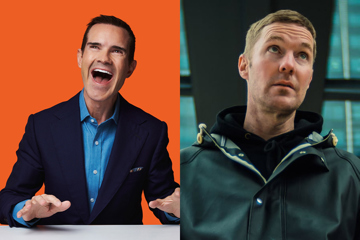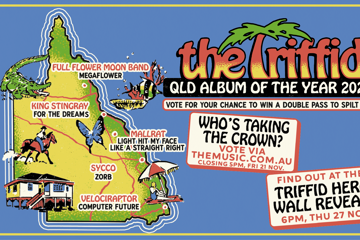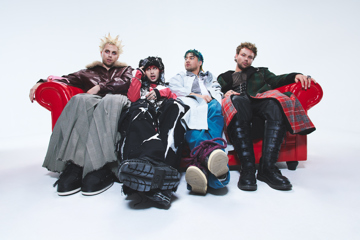The Lost Art Of Keeping A Secret
“I don’t know where the ‘lucky hat’ rumour came from, though. It’s not true, man – I don’t have a lucky hat! We love Melbourne, we love Australia. We can’t wait to come back."
In an era in which every show ever is documented by some fool on their phone, those 'mythical gigs', ones whispered about with the reverie of legend and the conspiracy of rumour, are growing endangered. After all, being there to see Jay Reatard fight fans or The Brian Jonestown Massacre fight each other, or to witness Jeff Mangum return from the wilderness, loses its specialness when it's immediately digitised, dispatched and diluted into retweeted oblivion. Gladly, no known video exists of Glass Candy's one-and-only Melbourne gig, a tiny 2008 club show so deranged and overjoyous that it sparked countless post-gig myths. The best one – that Johnny Jewel was so mad that someone stole his lucky hat that he vowed never to play in Melbourne again. Jewel laughs when I tell him this. The prolific producer behind the Italians Do It Better label, and, in turn, its stable of acts (Glass Candy, Chromatics, Desire, Mirage, Farah, Symmetry), is sitting in a touring van, in a “burnt-out parking lot” on a crackhead-ish strip in Akron, Ohio, remembering the last time he was in Australia.
“It was a drunken, awesome night,” Jewel sparkles, in recollection. “At the end of the night, Ida [No, Glass Candy vocalist] brought everyone on stage. I was a wreck [by that time], and I think everyone who got up on stage was drunk, or at least having a wild time. It was a great show! I was playing barefoot, and someone stole my shoes, and then they stole all the knobs off the synthesiser – I guess people just got so excited – which made it very difficult to continue the tour. So, the next morning I did something I never do – I did something publicly negative. I went on MySpace – you remember MySpace! – and wrote, 'Thank you for stealing my only pair of shoes on the trip – burn in hell!' But then I deleted the post because I believe that, for better or worse, when you hit the stage or leave your house or take a train or get on a plane, you kind of have to submit to what happens – that's life. I felt it was childish of me to complain about it. I'm a better man, now.”
It's not just shows that give rise to legends about Jewel, but his entire way of working. The producer was born in Houston, Texas, and relocated to Portland in 1996 (these days, he's based half in Portland, half in Montreal; the latter city from where his girlfriend, Desire vocalist Megan Louise, hails). Two weeks after moving to Portland, Jewel met No (these aren't stage handles – both legally changed their names, living their lives as art), and Glass Candy began. At first, they were a band making raucous, glam-ish rock, but, slowly, they morphed into a downbeat disco act, pioneering the sound that would become Jewel's own.
Don't miss a beat with our FREE daily newsletter
Chromatics – who, after the release of their fourth album, 2012's Kill For Love, have become, if only for the time being, Jewel's best-known project – began life as a separate entity entirely, formed in 2001 in Portland by a crew of ex-Seattle punks – future members of Gossip, Shoplifting and Past Lives – as a no-wave band. After Chromatics' debut LP, 2003's Chrome Rats Vs Basement Rutz, everyone left the band save guitarist Adam Miller, so he recruited Jewel, the record's producer, plus his studio right-hand-man, Nat Walker, and his then-girlfriend, Ruth Radelet. Chromatics, too, grew into a completely different beast, inching ever closer, in sound and spirit, to Glass Candy.
After Chromatics officially released 2004's Plaster Hounds, Jewel would start doing something that, at the time, seemed revolutionary – giving away his music for free. With the MySpace era in full swing, Glass Candy made their whole back-catalogue available online, and would freely upload all their new recordings. “Everyone thought it was insane back then,” Jewel recounts. “But it just seemed inevitable. We knew the way music was going. And we saw the positives in it.”
With their music trading freely, a fervent underground cult grew around Glass Candy, fuelled by Jewel's workaholic nature. Every time the band went on tour, he'd effectively make a new album; and, like some modern-day Arthur Russell, he'd obsessively make unending edits of the same songs, a perfectionist thirsting for perfection; a studio rat chasing dreams in glittering disco hues.
Jewel's 'coming out' year would be 2007, and for Italians Do It Better, the label he'd started with Troubleman Unlimited founder Mike Simonetti. That year, IDIB would release Chromatics' Night Drive LP, a soundtrack to an imaginary film whose highlight was a deadzone disco cover of Kate Bush's Running Up That Hill; Glass Candy's second proper LP Beatbox and the After Dark compilation, which was entirely produced by Jewel, and documented the label's growing family. These three records became their own movement – a critical touchstone for those chronicling the revival of Italo-disco and the rise of electrofied indie bands.
Glass Candy's shows in Australia came early in 2008 (for the V Festival, which these days feels as much a relic as MySpace), and, shortly thereafter, those days in which Jewel turned out albums slowed significantly; replaced with a slow-moving secrecy – albums eternally billed as 'coming soon' – that creates a sense of mystery. The debut album for Farah, an Iranian-American singer from Texas, was recorded late in 2008; and Glass Candy began work on their third record, Body Work, in 2009. Yet both remain unreleased. Chromatics' double-album epic, Kill For Love, was due to come out in January, yet didn't; spontaneously arising, instead, in March, with Radelet and Miller not hearing the final version before it was out. The 15 October release date for the After Dark 2 compile has come and gone, and, at the time of typing, it doesn't yet exist.
“For me, the goal is to make a good record, and I have to work on it until that's how I feel about it,” explains Jewel. “And I need that distance from the music, almost as a second collaborator; like, when I come back to the track I hear it fresh. I get a better view of the music with time and space. That's something that's really crucial to the development and quality of the music... I feel like the song is unfolding itself, and it's my job as producer to get out of its way when I need to, and just let the magic – or whatever you want to call it – happen. And for me, that magic element is time.
“It's difficult to take that time, though, because people think things are a hoax,” Jewel continues. “People think the Farah record is a hoax. People thought Kill For Love was a hoax. People think there's no Glass Candy album. People think there's no After Dark 2. It's like, 'Jesus, let me have the room to make a fucking record!' But, in the end, everyone who was stressed out and anxious about when the Chromatics record was going to come out, well, now that's all done – the album is out and it's out forever. No one really remembers what it was like waiting for the record, because now it's just there. And if I were to rush a record just to get it out a few months earlier, then an inferior record would be there permanently. And that's not something I'm willing to do.”
Jewel estimates that between Chromatics, Glass Candy, After Dark 2, Desire, Farah, Symmetry and “miscellaneous soundtrack stuff”, he's currently “juggling around 150 pieces of really solid music”. Oh, as for that 'soundtrack stuff' – in 2010, Jewel was recruited to compose the score for Nicholas Winding-Refn's shrine-to-cool, Drive, and though much of his work got strong-armed out of the film by movie-biz suits (“It's not the director, but everyone who's paying the director,” Jewel sighs, “they all have an opinion, and 90% of those people have no clue what art is”), Desire's Under Your Spell still took pride-of-place in the picture; and, come Cannes acclaim in 2011, he was a hot Hollywood name.
“There's no doubt that a lot of people heard Chromatics for the first time in Drive,” Jewel offers. “But I don't know how tangible the benefits were. We're just starting to tour now [with Chromatics], and so we're just starting to see some of the difference it has made. It'll be interesting to see what it's like in Australia, this time.”
And, so, finally, at long last, Jewel returns to Australia. Maybe he can ask for his shoes back? Or his lucky hat? “I'd love those shoes back, well, unless someone else has been wearing them!” he laughs. “I don't know where the 'lucky hat' rumour came from, though. It's not true, man – I don't have a lucky hat! We love Melbourne, we love Australia. We can't wait to come back."
THE MANY REFRACTIONS OF JOHNNY JEWEL
Glass Candy
Jewel's first band is still his best. Ida No, the duo's cosmic lyricist and aesthetic stylist, is one of the great unsung frontmen in rock, an entertainer with heart, panache and natural kookiness. Whenever Body Work actually comes out, the internet may explode.
Chromatics
Chromatics' 2012 LP, Kill For Love, is a 78-minute double-album written during Jewel's breakup with vocalist Ruth Radelet. It's both intimate and vast (“There was a blue colour I knew Kill For Love needed to have, like a heavy atmosphere, like the way a fog rolls in off the tide”), a sound-portrait of growing up, growing apart, America, and the mythology of music-making.
Desire
Desire's first CD-R came from out of nowhere in late 2008. In 2009 the songs were polished into the proper LP, II, the only album Jewel released between 2007 and 2012. Based in Montreal and sung in both French and English (by his girlfriend Megan Louise), it's Jewel's poppiest project.
Farah
A teenage Iranian-American ingénue from small-town Texas, Farah recorded her debut LP with Jewel in 2008, but it's yet to be released. “While we were recording, she was in and out of the emergency room three times; it was this two-week period of total hell and awesome music,” Jewel recalls. “It's been difficult for me to visit the tapes because they're so intense.”
Mirage
The most mysterious of Jewel's projects – a classic disco outfit whose two other members, Achille Vettessi and Simone Adonai, are Italian. Mirage have, by my count, three tracks to their name (two on After Dark, one MySpace demo), but two due on After Dark 2. Whenever that comes out.
Symmetry
The duo of Jewel and his offsider Nat Walker (himself a member of Chromatics and Desire), Symmetry are a repository for the overflow from their scoring work. Their 2012 debut, Music From An Imaginary Film, featured contributions from Mirage and the rest of Chromatics, and was – egged on by the LP's cover – rumoured to be their rejected score for Drive.
Chromatics will be playing the following shows:
Saturday 10 & Sunday 11 November - Harvest, Werribee Park, Melbourne VIC
Saturday 17 November - Harvest Festival, Parramatta Park, Sydney NSW
Sunday18 November - Harvest Festival, City Botanical Gardens, Brisbane QLD







